 TV
TV In Which Bosch Has Tread Upon Our Last Nerve
 Thursday, April 27, 2017 at 11:59AM
Thursday, April 27, 2017 at 11:59AM 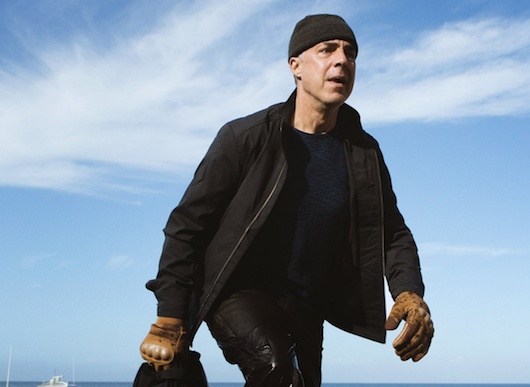
Nobody Counts
by ETHAN PETERSON
Bosch
creator Eric Overmyer
Amazon Studios
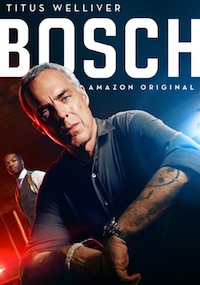 LAPD detective Harry Bosch (Titus Welliver) lives with his teenage daughter Maddie (Madison Lintz) in a glass apartment overlooking Los Angeles. One night he sees a fire in the distance, and gets a worried look on his face. You can only tell this from his eyebrows, since the rest of Welliver's 56 year-old countenance is generally frozen. His cheeks resemble those of a chipmunk's, or a victim of two parallel toothaches. In Bosch's third season, which rewrites Michael Connelly's minimalist source material present in three books into ten episodes, he almost never touches or is touched by anyone. You would be forgiven if you thought he was an angel or Bruce Willis in The Sixth Sense.
LAPD detective Harry Bosch (Titus Welliver) lives with his teenage daughter Maddie (Madison Lintz) in a glass apartment overlooking Los Angeles. One night he sees a fire in the distance, and gets a worried look on his face. You can only tell this from his eyebrows, since the rest of Welliver's 56 year-old countenance is generally frozen. His cheeks resemble those of a chipmunk's, or a victim of two parallel toothaches. In Bosch's third season, which rewrites Michael Connelly's minimalist source material present in three books into ten episodes, he almost never touches or is touched by anyone. You would be forgiven if you thought he was an angel or Bruce Willis in The Sixth Sense.
Breaking up the monotony of Bosch's days – he picks up takeout, he kisses his daughter on the head, he sleeps – is another, far better character. Irvin Irving (Lance Reddick) actually has things happen in his life that affect how he lives it. The LAPD's Chief of Police lost his son, his wife, and his house, but he is still very annoyed by Harry Bosch, and rolls his eyes at the guy after every single scene they share. After getting Bosch out of an IA complaint when he threatens the city's district attorney, Bosch screams, "I don't owe you!" at him. It is about that time when we start to conclude that perhaps Bosch is a miserable piece of shit.
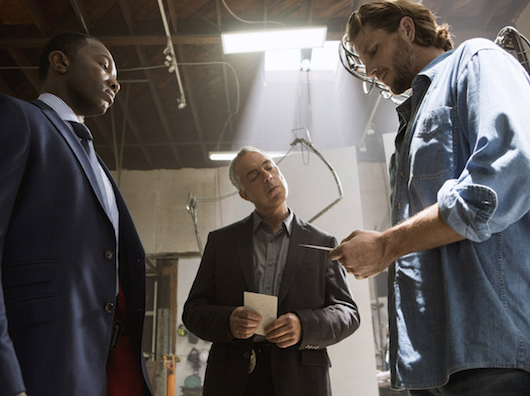
Bosch's motto is "Everybody counts or nobody counts," and he has a very soft spot for the following groups of people: runaways and orphans, because he was one, prostitutes, because his mother was one, and cops, because he is one. He meets Sharkey (Bridger Zadina), a homeless teenager, and has great sympathy for the boy despite the fact the kid has a loving mother and spends his evenings robbing men he picks up outside a liquor store.
In the show's least believable plot, Bosch is set up for a murder by an angry Hollywood director, who plants various items in the dead man's room before killing him. The concept of Bosch being a murder suspect would be an exciting twist to the series and it made for a great novel (A Darkness More Than Night), except Bosch creator Eric Overmyer (The Wire) finds this and so much of the original material ludicrous and has this angle fall apart within an episode. Bosch has never had a single believable adversary during the entire run of this show.
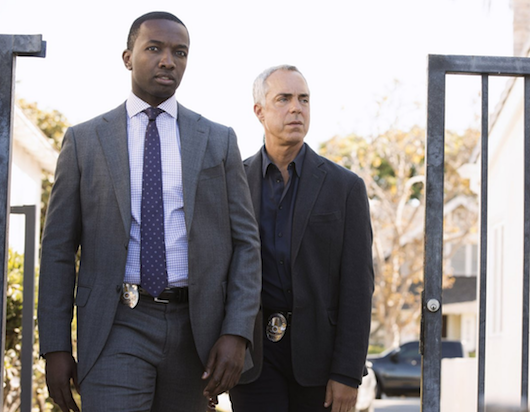
But maybe that's for the best, since looking slightly uncomfortable or subtly upset is not really in Titus Welliver's wheelhouse as an actor at this point. Welliver received his break portraying various characters on David Milch shows – NYPD Blue, Brooklyn South, Deadwood - throughout the years. Milch loved his coldness and lack of feeling, and it sort of works to carry a show like this, since the dialogue and action-heavy plots do not lend themselves to much emotionality.
The best part of the novels was being able to follow Bosch through the years, as he met a daughter he never even knew existed, and learned to live a different sort of existence. This element is completely scrubbed from the Amazon series, which began when Maddie was twelve. Bosch's parenting is not particularly on the mark, but we never see him struggle with his daughter at all. She just wants to be a police officer and learn how to drive, just like her dad!
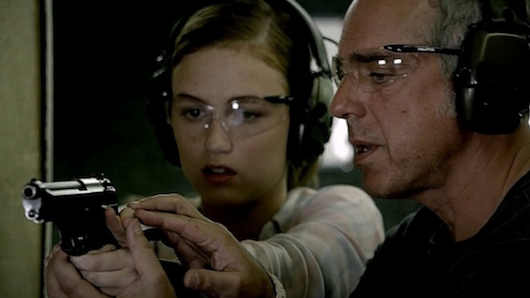
It is never completely explored why Maddie would like to be like this monster, which probably represents some dark aspect in her own nature. The other women in Bosch share the same fate, but we never really see what they like about Harry – it actually makes sense that a woman would be attracted to such a malevolent figure, but most women who date Bosch seem to basically be fucking him until they get bored.
Other supporting characters besides Lance Reddick are intriguing enough to ensure that Bosch never gets dull no matter how much food Welliver stores in his cheeks, or how often he not-so-dramatically tilts his head to the side like a beagle. His captain Grace (Amy Aquino) has an interesting home situation and an intense mien; his partner Jerry Edgar (Jamie Hector) is dealing with a complicated divorce and gifted children; his ex-wife Eleanor (Sarah Clarke) looks to be slowly decaying from the inside. What a nuanced cast, all waiting their turn to be like, "Haaaaaaaary."
So why has Bosch been the most successful of the original offerings Amazon has presented over the past few years? (The show has already been funded for a fourth season.) It is gratifying to watch a series that requires so little to succeed, and that actually has long term stories, however flimsy they may be once you unpack them in your mind. Watching Bosch is like consuming a light-crispy pastry in the morning. You forget it as soon as it passes through you.
Ethan Peterson is the reviews editor of This Recording.






































